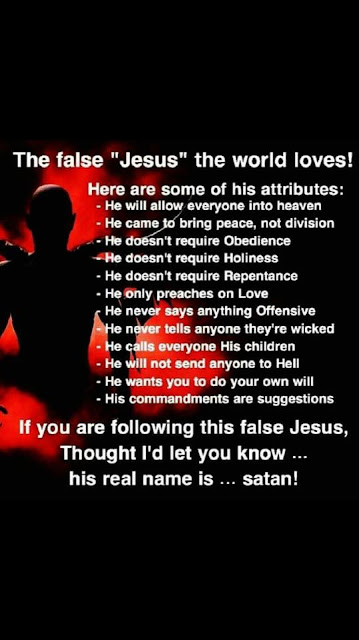How do we differentiate between the true and the false gospel?
The true gospel focuses on the cross whereas the false gospel emphasises the success, happiness, comfort and fulfillment of man (1 Corinthians 2:2).
The true gospel tells us to deny ourselves ( Luke 9:23) whereas the false gospel turns God into a genie to serve us. http://bit.ly/1ANB0Mc
The true gospel leads the believer first and foremost to ask, What can I do for you, God? (Colossians 3:1-3). But the false gospel leads the believer first and foremost to ask, What can God do for me? http://bit.ly/1yGV0CE
The true gospel emphasises the need for genuine repentance out of godly sorrow for our sins (with resultant change in worldview and lifestyle) whereas the false gospel sees “repentance” as merely changing one’s mind (giving mental assent to the fact that God sees you as pure). http://bit.ly/1k61NQt
The true gospel tells us that, if we fall into sin after conversion, we should confess our sins whereas the false gospel tells us that only a one-time confession of sins at conversion is all that is necessary. http://bit.ly/1rcYJzl
The true gospel makes no provision for automatic forgiveness of sins we have yet to commit in the future whereas the false gospel declares that the future sins of believers are automatically forgiven (FSAF) from the time of conversion. http://bit.ly/1dXOjBB
The true gospel tells us there is a price to be paid for following God and the way to heaven is narrow and difficult whereas the false gospel entices man with benefits and gives us a comforting but false assurance that the way to heaven is going to be easy (Matthew 7:13-14).
The true gospel not only tells us about the benefits Jesus secured for us at the cross (forgiveness, healing, victory over death, sin and satan) but also the need for personal responsibility (the need to stop sinning and work out our faith with fear and trembling). The false gospel gives a lopsided emphasis on these benefits and downplays personal responsibility.
The true gospel is about God being Lord and Saviour—about the demands our Lord makes on our lives as much as it is about the blessings we stand to gain from Him being our Saviour. But the false gospel downplays the demands the Lord makes on us but emphasises the blessings our Saviour showers upon us.
The true gospel makes sure believers understand these “hard sayings”—cost of discipleship, suffering, persecution, need for endurance and perseverance. The false gospel downplays the significance of these themes in the life of the believer. http://bit.ly/1imb1GN
The true gospel sees God as a God of love, mercy and grace as well as a God of justice, holiness and righteousness. The false gospel primarily sees God as a God of love, mercy and grace and discounts / downplays the harsh side of God, giving believers a false impression that He is a celestial Santa Claus. http://bit.ly/1dXojrr
The true gospel tells us, even though believers are saved at a point in time, they can lose their salvation and have their names blotted from the book of life, not because God does not want them but because they do not want God. The false gospel tells believers that once saved, they are always saved (OSAS): Having bought their ticket to heaven (conversion), they are on autopilot mode all the way till they arrive at their heavenly destination. http://bit.ly/1nm6nuK
The true gospel raises the bar to whosoever who would follow God but the false gospel makes following God an easy, pleasant and attractive proposition through sharing its blessings and benefits. http://bit.ly/18jlBsg
The true gospel presents to you a life that is difficult now but will be easy later. The false
gospel presents to you a life that is easy now but will be difficult later.
The true gospel leads you to heavenly bliss in future. The false gospel leads you up the garden path of deception—and possibly damnation.
Preaching a soft and easy, diluted, false gospel that merely blesses people but fails to emphasise the cross not only leads people astray but produce weak believers who won’t be able to endure the tests, trials and tribulations of these perilous end times. http://bit.ly/1ANB0Mc
“Any message that doesn't give the full or complete Gospel is a false Gospel. This means not only Jesus saves but also about sin, damnation, and repentance. Without conviction of sin there is no repentance. Without repentance there is no salvation. Jesus took the punishment of our sin in our place on the cross. He rose from the grave to defeat death. The wages of sin is death and godly sorrow produces a repentance leading to salvation.”
— David Whittlesey
RELATED POSTS
IS CONFESSION REDUNDANT?
Hyper-grace teaches us that, after our one-time confession of sin at conversion, believers no longer need to confess our sins. Is it true that sin has been dealt with ‘once and for all’ at conversion?
http://bit.ly/1rcYJzl
GRACE AND HYPER-GRACE IN A NUTSHELL
RELATED POSTS
FUTURE SINS AUTOMATICALLY FORGIVEN?
Are the future sins of Christians automatically forgiven (FSAF)?
Hyper-grace teaches us that, after our one-time confession of sin at conversion, believers no longer need to confess our sins. Is it true that sin has been dealt with ‘once and for all’ at conversion?
http://bit.ly/1rcYJzl
GRACE AND HYPER-GRACE IN A NUTSHELL
The basics about grace and hyper-grace
IS REPENTANCE MERELY CHANGING ONE’S MIND?
Some say that believers only need to change their mind (correct their past erroneous thinking) when they repent. Is this what the Bible teaches?
http://bit.ly/1k61NQt







No comments:
Post a Comment